Plastic Recycling for Sustainability or Business: What More Can Be Done
Mitsui Chemicals India Blog Series
2022.02.17
Mitsui Chemicals India Pvt. Ltd.
Every year, over 380 million tons of plastic are produced globally. Approximately 79 percent of total plastic waste is dumped into landfills and water bodies, 12 percent is incinerated, and only 9 percent is recycled. With our waste disposal habits and single-use plastic exacerbating the problem, this alarming situation requires immediate attention.
Plastic recycling can make a major contribution to preventing environmental degradation. By better modifying our current ways of plastic waste management, we can rectify this problem to a large extent. This article elaborates on ways to optimize and convert our plastic waste into materials that can be reused and brought back into the circular loop.
Plastic Pollution: A Major Threat
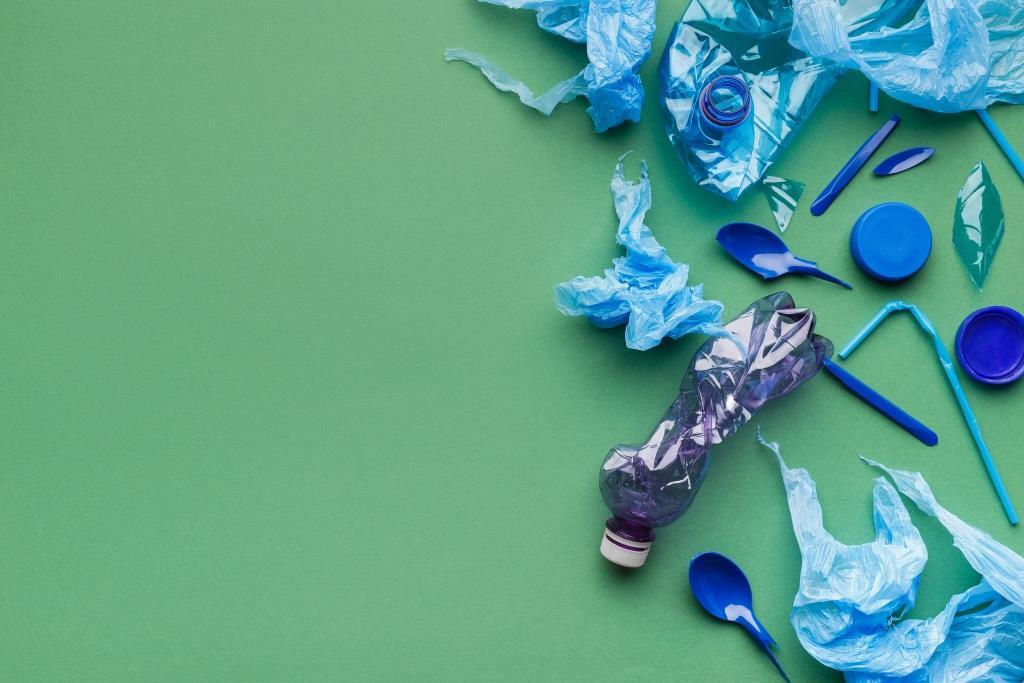
Plastic is a non-biodegradable compound composed of various toxic elements. Our everyday lifestyle involves direct or indirect usage of plastic. Plastic waste is frequently rendered unrecyclable due to improper disposal. It also contributes to the accumulation of unattended plastic waste, which harms the ecosystem significantly. Plastic pollution has a wide range of consequences, including:
- i. Risk to human health: If food is stored in low-quality plastic, it gets contaminated. Its consumption causes various health issues such as stomach infection, allergies, etc.
- ii. Poisonous for animals: Because there is no clear segregation of waste, our discarded plastic waste frequently gets mixed with biodegradable kitchen waste. Stray animals that feed on discarded food items end up consuming the discarded plastic waste. This ingested plastic irritates their digestive system and can be fatal.
- iii. Harms marine life: When plastic waste is dumped into water bodies, it converts into marine debris. The presence of marine debris diminishes the soil and water quality, and if consumed by the living organisms, it can harm them immensely. Hence, it jeopardizes the survival of aquatic flora and fauna.
Collecting and recycling are the most effective methods of reducing plastic pollution. To achieve a sustainable future, we must protect and strategically use our natural resources. As consumers, we must be conscious of our preferences and place more emphasis on a market niche for recycled products.
Challenges with Plastic Recycling
Plastic is undeniably a traditional and convenient option that is versatile and inexpensive, but it is not the best solution. Its recyclable capacity varies according to its use. Non-recyclable plastic waste is eventually discarded into landfills, water bodies, or incinerated (releasing greenhouse gases), resulting in environmental pollution. Plastic is difficult to recycle for the following variety of reasons, including:
- i. Several plastic products consist of multiple layers and types of plastic. These layers are almost unbreakable; this makes recycling expensive and complex.
- ii. Non-recyclable and low-quality plastic packaging is contaminated by food and other chemical substances. Thus, the plastic resins do not remain hygienic enough, which restricts their reusability.
- iii. Recycling is an enduring procedure that costs highly. It is therefore unreasonable to treat this plastic waste every day in small quantities.
At Mitsui Chemicals India, we acknowledge such barriers and promote a sustainable approach to development. We envision our solutions to be economical and eco-friendly, with high reliability.
Recycling Policies: This Is What Your Business Needs
Recycling is indeed beneficial for the environment, but its advantages go beyond it. Including recycling techniques and recycled products help in gaining a better financial position for your business in the market. Recycling brings significant results for your business through following ways:
- i. It has the potential to increase your sales because, as in the current situation, consumers prefer a healthy-environment approach and are willing to pay a premium for it. For example, demand for plastic bottles with 50% recycled materials is on the rise.
- ii. It helps in creating a brand value and helps in gaining consumer attention and positive feedback.
- iii. Such initiatives are recognized by government organizations, journalists, and other public platforms that help your brand's marketing.
- iv. It also helps create more local jobs that benefit the marginalized sector, especially in a labor-intensive country like India. This adds a social value to your business which gains public interest.
How Much and What Type of Plastic is India Recycling?
India is a vast country with enormous plastic users. According to a recent report by CSE India, we recycle approximately 5.5 million metric tons of plastic waste each year. It further states that this statistic represents only 60% of the total plastic waste produced in the country. Nearly 70% of total recycled plastic waste is treated at registered sites, 20% is recycled by the unorganized sector (such as rag pickers, small junk dealers, and so on), and the remainder is recycled by consumers or households. The remaining 40% of total plastic waste produced goes unattended, polluting our environment.
Plastic goods are categorized into seven groups. The categories of thermoplastics and their share in the total recyclable plastic in India are described in the table below:
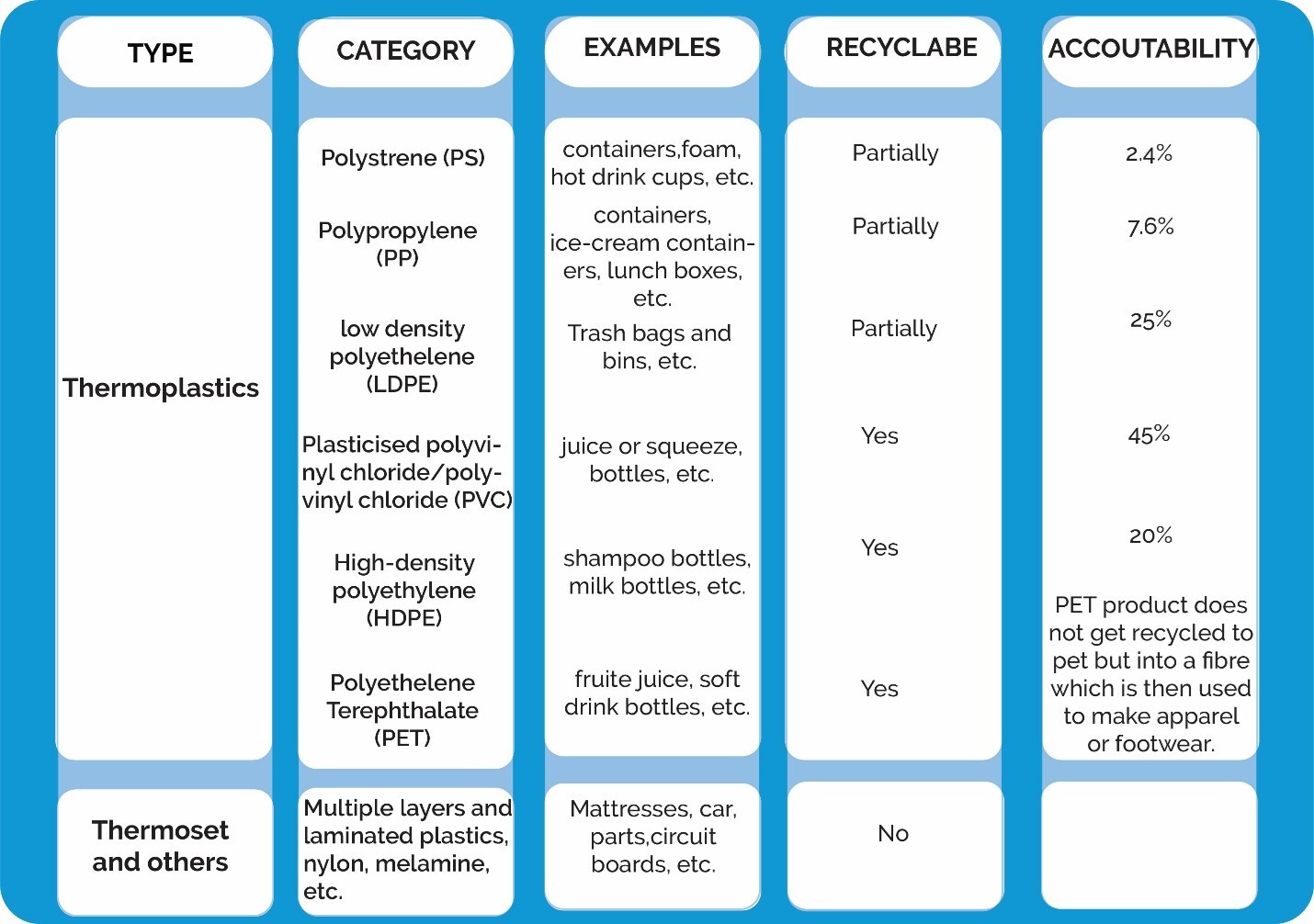
What more can be done?
Our method of waste disposal plays a significant role in deciding what happens to it afterward. The core cause of plastic pollution is its unruly disposal. We should be more conscious that our actions directly impact the environment. To begin with, consumers should adopt the principle of Reduce-Reuse-Recycle in their daily routine. We should replace single-use plastic products with those that are easily recyclable or manufactured from recycled materials. The following products and services are our solutions and initiatives towards sustainability:
1. TAFMERTM
TAFMERTM by Mitsui Chemicals is added in the recycling process to enhance the quality of the recycled material. Recycled products are assumed to be of lower quality, but the addition of TAFMERTM ensures that users receive an upgraded version of recycled products. It helps in boosting product performance when mixed with biomass materials and inorganic compounds. It also contributes to reducing the use of plastic. It is a reliable food packaging material because of its following properties:
- i. The addition of TAFMER™ improves the impact resistance and tensile elongation of the product.
- ii. The heat-sealing technique ensures that it keeps its contents fresh and edible.
- iii. Since it is non-toxic, it helps in maintaining hygiene.
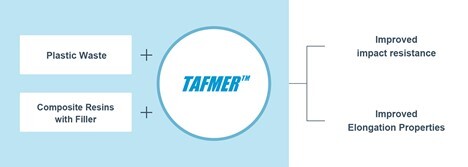
2. PAULOWNIATM
Paulownia™, our line of Polypropylene (PP) or Polyethylene (PE) foam sheets with a unique cell structure, has a foam extrusion expansion range of 2 to 5 times. It is the best substitute for solid PP or HDPE sheets, cardboard, plywood, etc. It has the following features which make it unique and beneficial:
- i. It is easy to use because of its lightweight.
- ii. Excellent cutting quality and rigidity simultaneously.
- iii. It is multipurpose due to its water and chemical resistance.
- iv. Ensures the safety of the handler because of its smooth texture.
- v. Available in different variations as per any specific requirements.
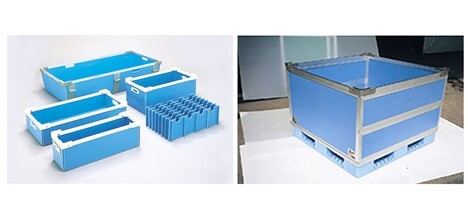
3. T.U.X.TM
It is an LLDPE (linear low-density polyethylene) cast film that is produced with T-die extrusion technology. It is widely used as a high-performance sealant film for packaging frozen food, pickles, liquid foods (such as soups), heavyweight products such as rice, etc.
- i. It remains unaffected by excess heat and cold.
- ii. It makes the appearance attractive with its transparency and luster.
- iii. These sheets are impact resistant and hence, maintain the food hygienic.
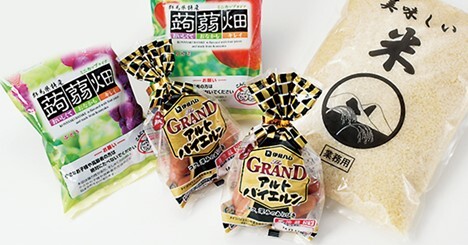
4. L-SMARTTM
It is an eco-friendly LLDPE packaging film. This BOPE film can be used to pack frozen or chilled foods, snacks, etc. It has a lustrous and slim finish which makes it more aesthetically appealing to customers. It has the following feature that makes it a suitable choice:
- i. Highly impact resistant.
- ii. It is ecologically sound.
- iii. The maximum holding capacity ranges to 85°C.
- iv. Extremely reliable for its hygiene.
5. Study to Support Chemical Recycling in Japan
We collaborated with BASF, a company with sustainability at its core, to launch a study to support Chemical Recycling in Japan. Through this study, we promote the effectiveness and efficiency of recycled materials in the country. We believe that we can create a sustainable future by adopting and encouraging recycling techniques. Plastic recycling also contributes to regulating climatic deviations caused due to pollution. Further benefits of our initiative are as follows:
- i. Since plastic is produced from hydrocarbons derived from fossil fuels, recycling plastic will reduce its demand, which will help conserve our natural resources.
- ii. It is a feasible solution because recycled products usually cost less.
- iii. It encourages the use of domestic products.
- iv. It does not require any raw materials and thus, saves energy.
Our Approach towards Sustainability
Plastic pollution is one of the trigger causes of global warming. It harms the environment and our health in various ways. It is of utmost importance that we focus our vision on the welfare of the environment and society. Innovation and improvisation in our technologies and strategies are much needed to achieve our goal of sustainability. Thus, our responsibility is to put in all our efforts to introduce effective solutions for this problem and plastic recycling is the ultimate solution for several issues.
It is necessary to supervise how good a product is for the consumers and the environment. At Mitsui Chemicals India, we understand our responsibilities and put in all our efforts to provide the best products and services. We aim to create a sustainable future with our benchmarks Rose ValueTM and Blue ValueTM to ensure that our products and services maintain high performance to improve quality of life and remain ecological.
To incorporate our solutions into your business and take a step towards a more sustainable future, contact us.
